Description
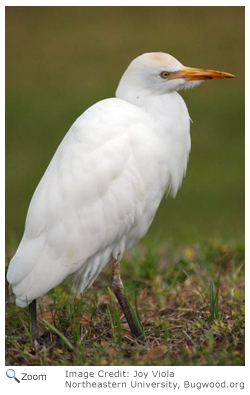 The cattle egret is a small white heron about 19-21 inches in length with a wingspan of about three feet. It often looks like it is hunched over. It has short legs and a thick neck compared to other species of egrets. The cattle egret is a small white heron about 19-21 inches in length with a wingspan of about three feet. It often looks like it is hunched over. It has short legs and a thick neck compared to other species of egrets.
Adults have dull yellow or orange bills and dull orange legs. Immature cattle egrets have black legs and bills. During breeding season, it has a brownish crown and chest, and its eyes, legs, and bill are red.
Range 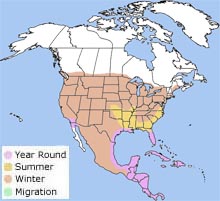 The cattle egret is found from southern Canada south to South America and the Caribbean. It is also found in Europe, Asia, Australia, and Africa. The cattle egret is a non-native species in North America. It probably flew to South America from Africa and then moved up into the United States and Canada. The cattle egret is found from southern Canada south to South America and the Caribbean. It is also found in Europe, Asia, Australia, and Africa. The cattle egret is a non-native species in North America. It probably flew to South America from Africa and then moved up into the United States and Canada.
Habitat 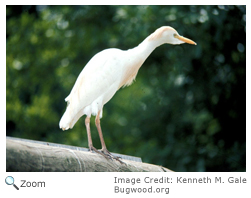 The cattle egret is most often found near farmland and livestock. It is also found in wetlands. The cattle egret is most often found near farmland and livestock. It is also found in wetlands. | |
Diet 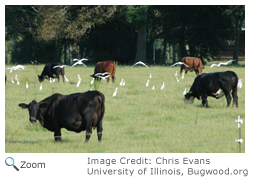 In Africa, the cattle egret eats insects that are stirred up by wild animals. They have adapted to following animals like cows in North America and eating insects like grasshoppers, crickets, spiders, and flies that are disturbed by cows and other livestock as they are grazing and moving around. In Africa, the cattle egret eats insects that are stirred up by wild animals. They have adapted to following animals like cows in North America and eating insects like grasshoppers, crickets, spiders, and flies that are disturbed by cows and other livestock as they are grazing and moving around.
Life Cycle 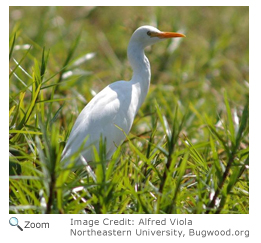 Males claim territory before mating begins. They go through a variety of display behaviors to attract females. Females gather in their territory and sometimes jump on the backs of the males. Eventually, the male evicts all but one female. Both the male and the female work on building a nest. The male brings the materials, sometimes stealing sticks from the nests of other egrets. The female constructs the nest. The nest is made of sticks and is built in a bush or a tree. The female lays three to five eggs and both parents incubate the eggs. The chicks hatch in three to four weeks and fledge when they are a month old. Both parents care for the chicks. Cattle egrets nest in colonies with other species of egrets. Males claim territory before mating begins. They go through a variety of display behaviors to attract females. Females gather in their territory and sometimes jump on the backs of the males. Eventually, the male evicts all but one female. Both the male and the female work on building a nest. The male brings the materials, sometimes stealing sticks from the nests of other egrets. The female constructs the nest. The nest is made of sticks and is built in a bush or a tree. The female lays three to five eggs and both parents incubate the eggs. The chicks hatch in three to four weeks and fledge when they are a month old. Both parents care for the chicks. Cattle egrets nest in colonies with other species of egrets.
Behavior 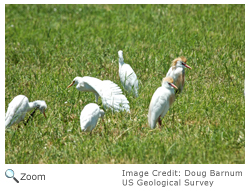 Cattle egrets are very social. They gather in large colonies of cattle egrets and other bird species. In addition to following livestock, they also follow farm equipment, like tractors, to catch insects that are disturbed. Cattle egrets are very social. They gather in large colonies of cattle egrets and other bird species. In addition to following livestock, they also follow farm equipment, like tractors, to catch insects that are disturbed.
|


 The cattle egret is found from southern Canada south to South America and the Caribbean. It is also found in Europe, Asia, Australia, and Africa. The cattle egret is a non-native species in North America. It probably flew to South America from Africa and then moved up into the United States and Canada.
The cattle egret is found from southern Canada south to South America and the Caribbean. It is also found in Europe, Asia, Australia, and Africa. The cattle egret is a non-native species in North America. It probably flew to South America from Africa and then moved up into the United States and Canada.



